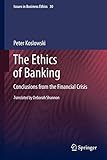The Ethics of Banking : Conclusions from the Financial Crisis / by Peter Koslowski.
Tipo de material: TextoSeries Issues in Business Ethics ; 30Editor: Dordrecht : Springer Netherlands : Imprint: Springer, 2011Descripción: xv, 214 páginas recurso en líneaTipo de contenido:
TextoSeries Issues in Business Ethics ; 30Editor: Dordrecht : Springer Netherlands : Imprint: Springer, 2011Descripción: xv, 214 páginas recurso en líneaTipo de contenido: - texto
- computadora
- recurso en línea
- 9789400706569
- HG1-9999
Springer eBooks
Preface -- Introduction: Is the Finance Industry Ethically Irrelevant? -- Part A Foundations of Business and Finance Ethics -- Chapter 1 Ethical Economy, Economic Ethics, Business Ethics -- Part B The Ethical Economy and Finance Ethics of the Markets for Credit, Capital, Corporate Control, and Derivatives -- Chapter 2 The Ethical Economy of the Credit Market -- Chapter 3 The Ethical Economy of the Capital Market -- Chapter 4 Insider Knowledge and Insider Trading as Central Problems of Finance Ethics -- Chapter 5 The Ethical Economy of the Market for Corporate Control and for Corporate Know-How -- Chapter 6 The Ethical Economy of the Market for Derivatives: Trading with Values Derived from Other Values for Hedging, Speculation, and Arbitrage -- Chapter 7 Interdependences Between the Financial Markets for Credit, Capital, and Derivatives, and the Challenges the Financial Markets Pose for Ethics -- Chapter 8 The ‘Banking Secret’ and the Right to Privacy The Banks’ Duty of Confidentiality and Banking Secrecy -- Part C Financial Wagers, Hyper-Speculation, Financial Overstretch The Financial Market Crisis of 2008 and Finance Ethics -- Chapter 9 Financial Wagers, Hyper-Speculation, and Shareholder Primacy -- Chapter 10 Financial Overstretch The Epochal Disturbance of the Invisible Hand of the Market by the Financial Industry -- References.
This book analyzes the systemic and the ethical mistakes that have led to the financial crisis of 2008. It explores the middle ground between the argument that financial managers cannot be expected to take responsibility for a systemic crisis and the argument that moral failure is the one and only origin of the crisis. The book investigates the role of speculation in the formation of the crisis. It distinguishes between productive speculation for hedging and for securing market liquidity on the one hand, and unproductive and even detrimental hyper-speculation, on the other. The book argues that hyper-speculation goes far beyond the degree of speculation that is necessary for the liquidity of financial markets in a developed economy, and has thus increased the risks of the financial system and will continue to do so. This book offers an ethics of banking and an ethical economy of the financial markets to counterbalance the financial industry’s purely economic approach.
Para consulta fuera de la UANL se requiere clave de acceso remoto.


